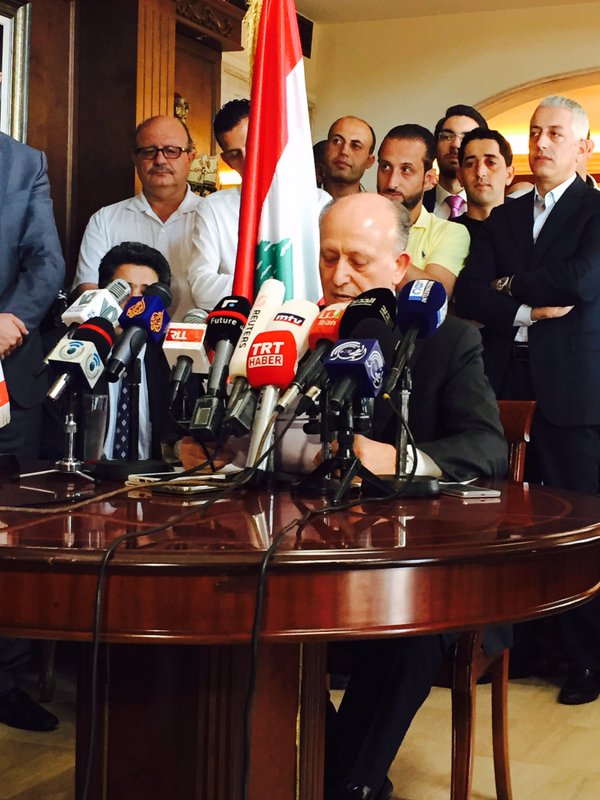Rifi’s gamble pays off
Alex Rowell/Now Lebanon/May 30/16
Surprise victory for renegade March 14 hawk Ashraf Rifi in Tripoli’s municipal elections suggests his cabinet resignation was shrewd.
Love it or hate it, there’s no denying the remarkability of the feat pulled off by retired Internal Security Forces chief Maj. Gen. Ashraf Rifi at the municipal ballot box in Tripoli yesterday.
Competing alone against an all-star coalition of establishment heavyweights, including two billionaire former prime ministers, the son of a grain miller from the humble Al-Qubba neighborhood with just two years of political experience on his CV swept between 17 and 22 of the available 24 seats, according to preliminary results.
It was an outcome even his ardent supporters hadn’t expected. In the blue-collar Bab al-Tabbaneh quarter, notorious in past years for deadly Syria-linked militia battles with its Jabal Mohsen neighbor, residents almost unanimously told NOW Thursday Rifi was their man, yet even they didn’t expect his ‘Tripoli’s Decision’ list to take more than about five seats off the ‘For Tripoli’ favorite. Former Prime Minister Najib Miqati, one of the latter’s two key sponsors, was alleged to be paying handsomely for votes, and it was money, they said, rather than politics that would carry the day.
In the event, exactly the reverse happened. Municipal elections are normally fought over strictly local affairs; often reduced to little more than arcane family rivalries. Yet Rifi ran on an overtly politicized ticket, castigating the list backed by Miqati and Future Movement head Saad al-Hariri as an Iranian-Syrian Trojan Horse, implicitly accusing Hariri, his erstwhile ally, of selling out the principles of the Cedar Revolution. This was of a piece with the general trajectory Rifi has taken since resigning as justice minister in February, a decision he said at the time he made because, “The practices of Hezbollah’s statelet and its allies are not acceptable and staying in the government means approving them.” Back then, many thought the move a reckless gamble; a futile stunt he would later live to regret. Today, that assessment would seem to need revising.
How did he manage it? His critics will say he pandered to the currents of Sunni Muslim religious conservatism in the city, in contrast to the moderation and pluralism of the Hariri-Miqati coalition. There’s obviously some truth in this – in the days leading up to the election his public pronouncements included such tweets as, “The Sunni sect does not and will not know defeat, for the Sunnis believe in themselves and are strong in their faith.” And who could forget him trying to criminalize the burning of the ISIS flag? Still, it’s worth noting the most explicitly theocratic party in the race, the Muslim Brotherhood-affiliated Al-Jamaa al-Islamiya, in fact ran on the opposing list. As for Tripoli’s truly hardcore Salafist-jihadist minority, they wouldn’t be caught partaking in the idolatrous abomination of democratic voting for any candidate.
The more salient point is that he tapped into street-level frustration with the political accommodations made by the March 14 leadership. “Out of spite,” was a phrase repeated by a mechanic in Bab al-Tabbaneh by way of explaining why he was voting for Rifi. Tripolitans have not forgotten the horrific car bombs outside mosques in August 2013 (later linked by investigators to the Syrian regime), nor the assassination of their son, former minister Mohammad Chatah, by the same means four months later. Rifi’s indignant demand for the retrial of Michel Samaha, a politician released on bail after just three and a half years’ imprisonment for plotting more bomb attacks on civilian targets in north Lebanon (again in coordination with Damascus), was understandably appreciated by many in Tripoli, just as Hariri’s statement at the time that “the stance of Minister Rifi doesn’t represent me” can only have bred rancor. Add to this Rifi’s vehement rejection of the presidential candidacy of staunch Assad ally Sleiman Franjieh, mysteriously endorsed by Hariri, and the former security czar’s popularity in the city is not difficult to comprehend. At a time of disenchantment with the government generally – aggravated by socioeconomic neglect – most Tripolitans evidently feel Rifi is the only one sticking up for them.
This will have obvious implications for next year’s parliamentary elections, when Rifi will have to be accounted for as the city’s new za`eem, or kingpin. What’s not clear, however, is how much impact any of it will have outside Tripoli. The Future Movement may well feel pressed to take a harder line against Hezbollah rhetorically, but it’s unlikely to rock the boat in any dramatic way. Perhaps, now that Rifi has shown Hariri he wields genuine political weight independent of his former patron, the two will come eventually to some sort of amicable reconciliation, for instance with Rifi getting the interior minister position in the next cabinet that he was said to covet aggressively last time round. Already, Rifi has signaled overtures to Future, telling a radio station Monday his “door is open” to business with them. Equally, however, he may continue his new solo path, and try to challenge Hariri’s stature on the national stage. That would be a tall order, but the past year has brought about stranger shakeups. Today more than ever in Lebanese politics the governing law seems to be that anyone who thinks they know what’s going on hasn’t a clue what’s going on.























